
You can’t really celebrate the 50th anniversary of Star Trek without talking about Galaxy Quest, the 1999 satirical homage to the Star Trek franchise and its fanbase. Star Trek: The Original Series generated a massive following of fiercely dedicated fans, who basically created organized fandom and are the reason the franchise is still alive today. But along the way, Star Trek fandom became characterized as a cult-like group of overzealous fans obsessed with the sci-fi phenomenon. A film like Galaxy Quest that sought to parody the revered franchise was indeed walking a fine line. Patrick Stewart expressed reservations about seeing the film at first, as he’d heard it made fun of Star Trek, and writer Robert Gordon initially turned down the job of retooling David Howard’s original script (then called Captain Starshine), being hesitant as a fan of Star Trek himself. But Galaxy Quest has gone on to become a cult classic and is beloved as an affectionate parody of Star Trek by creators, fans, and cast members alike.
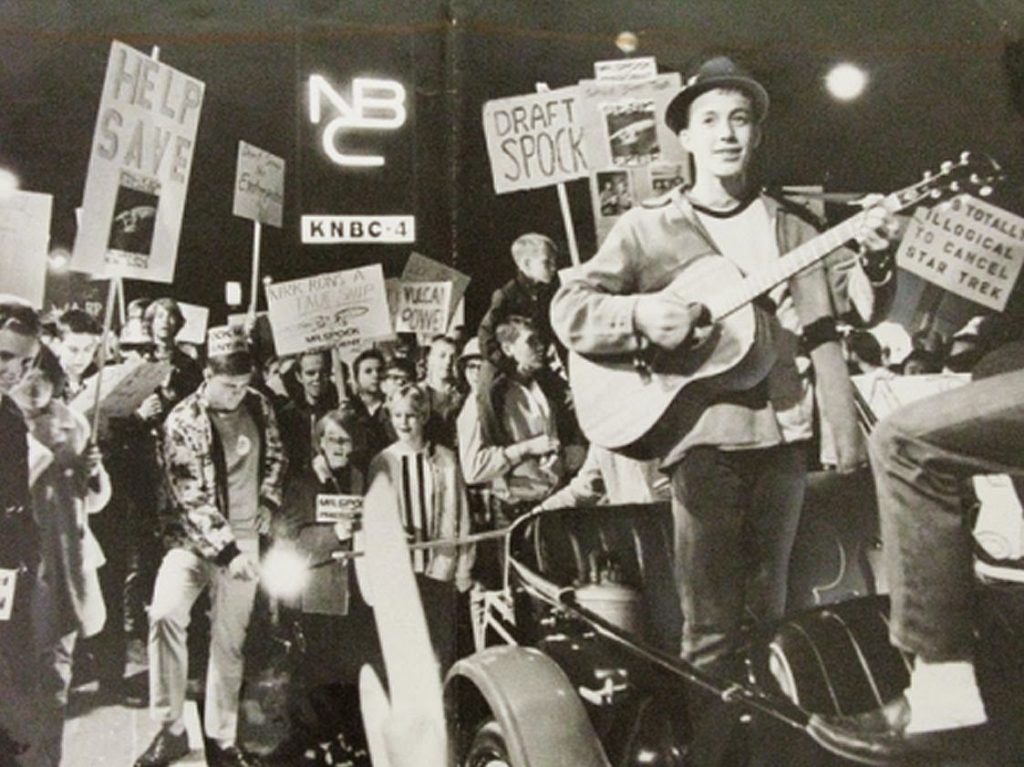
When TOS ended in 1969, it had amassed a devoted following that, in 1968, led a successful fan campaign to stave off cancellation for the last season. Fans flocked to the show as reruns ran into syndication during the 70s and attracted new, younger viewers. The fandom’s identity grew through expressions of intricate cosplay, encyclopedic fan fiction, and zealous conventions. A cultural phenomenon began to emerge, leading up to a convention in Chicago in 1975 where over 16,000 Trekkers gathered to see the entire cast reunited for the first time.
The cult status achieved by the show among its fans convinced Paramount to begin work on a feature film in 1975, though Star Trek: The Motion Picture wouldn’t be released for another four years. The fans were an integral part in keeping the franchise alive during that time, but they had also achieved a cult-like status of their own as the Trekkie stereotype took hold of the general public. Journalists portrayed them as obsessive, socially maladjusted dorks that were sometimes severely detached from reality. The negative connotation of the term Trekkie even caused a rift among fans as early as the 1970s, where those who deemed themselves enthusiastic, but rational followers wanted to be referred to as Trekkers to distance themselves from the stereotypical image of worshiping fanatics.
Nevertheless, the demands of enthusiasts took a toll on creators and cast members, who were overwhelmed by the following the show had garnered over the years. Many had unpleasant run-ins with overenthusiastic fans, a group even once tried to rip off William Shatner’s clothing in front of 30 Rockefeller Plaza. In a now infamous sketch for SNL! in December 1986, Shatner plays himself at a Star Trek convention and tells a gathering of fanboys to “Get a life!”, mocking them as obsessive weirdos and wondering if they’d ever even kissed a girl. The sketch was considered by fans to be insulting, but also largely inaccurate.
“This upset many Star Trek fans, who knew from convention experience that most people attending are not teenage boys; on the contrary, in many Star Trek conventions, the majority of attendees are women over the age of 21. The adult majority that attend conventions are people who already “have a life.” – Joan Marie Verba, A Trekker Fan and Zine History, 1967-1987.
The stereotype of the Trekkie wasn’t created in a vacuum, but the issue with the skit is that it took aim at Star Trek in a manner that demeaned its fandom, referring to it as a “colossal waste of time.” To come from someone they dedicatedly supported was a smack in the face to many fans. Shatner published a book at the start of 1999 entitled Get a Life!, a nod to the 1986 sketch he reveals “was for me, at that time, equal parts comedy and catharsis…. I bought into the Trekkie stereotypes. In a nutshell, I was a dope.” It wasn’t until Kirk’s death in Star Trek: Generations that Shatner realized how much the franchise, and the character, had meant to him.
“ I found myself grieving. I felt guilty, melancholy, and depressed over a fictional funeral…. Had there always been a deeper connection than I was willing to admit? Was Star Trek really that important to me? Had I always been…a fan?” — William Shatner
In the years following Kirk’s death, Shatner endeavored to understand what it meant to be a Trekker, attending conventions incognito to interview fans, merchants, and collectors — and he was overwhelmed by how the show had meaningfully touched so many lives. His journey towards embracing fandom is at the heart of Galaxy Quest, which is about understanding the magnetic attraction that draws the sci-fi community together and keeps a franchise alive.
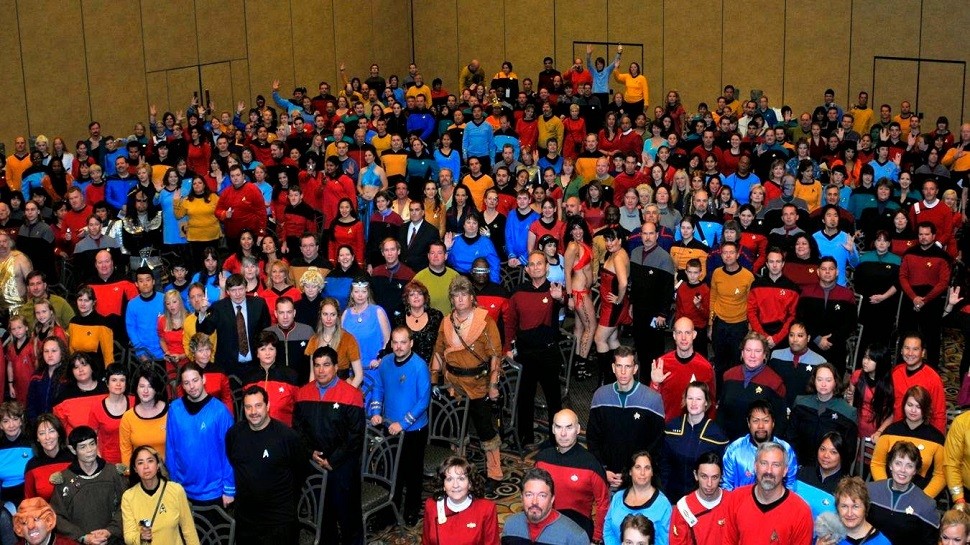
Galaxy Quest came at a time when it felt like Star Trek was in need of a dynamic renewal. Even the most passionate fans didn’t appear to be as ravenous as they once had been; the franchise hit a plateau. The fandom had grown perhaps too retrospective and lost the forward momentum that had propelled TOS and TNG. DS9 and Voyager never got quite the same viewership as their predecessors, especially with the assortment of syndicated programs running at the time. The two series garnered critical praise and were loved by fans in their own way, but were perhaps not as accessible to new audiences, which was integral to the resurgence of Star Trek back in the 70s.
The fanbase itself became further divided. Trekkers continued to push back on the fanatical Trekkie stereotype and both complained that casual fans were diluting the fandom. More than ever, it was apparent that Star Trek needed to embrace what had made it a phenomenon in the first place. Galaxy Quest was released just over 30 years after TOS first aired and is the perfect ode to a fandom so old that it predates the show itself. In homage to sci-fi fans everywhere, a mockumentary for Galaxy Quest, the TV show in the film, aired on E! prior to the movie’s release and there was even a lo-tech promotional website with a super fan webmaster.
The plot of Galaxy Quest is the ultimate dream of every Star Trek fan: everything in canon is real. The movie follows the cast of a defunct sci-fi show called Galaxy Quest. The cast members, led by the pompous Jason Nesmith (Tim Allen), are roped into an intergalactic adventure when an alien race mistakenly believes them to be heroic crew of the fictional NSEA Protector. The Thermians are basically super fans, the final form of the Trekkie if you will; they revere the crew with near religious fervor, referring to episodes of the show as ‘historical documents’ and modeling their entire society around them. The more down to earth fans (in the literal sense) are the Questarians, who continue to attend conventions for the show more than a decade after its cancellation — events that the cast reluctantly attends only to watch Nesmith bask in the limelight.
Many of the cast harbor resentment towards the fans and the characters they’ve been forced to embody for the better part of their careers. The actor Alexander Dane (Alan Rickman) who played the Spock-esque character on the show, was the most vocal in his loathing for the Galaxy Quest franchise and the iconic line he was known for. Not unlike Leonard Nimoy, he was typecast by his illustrious role and in the film is forced to wear his prosthetics when making public appearances. Typecasting can place actors at odds with fans, who are intent on self-perpetuating the series and this makes breaking away from their characters a constant struggle that slowly wears them down.
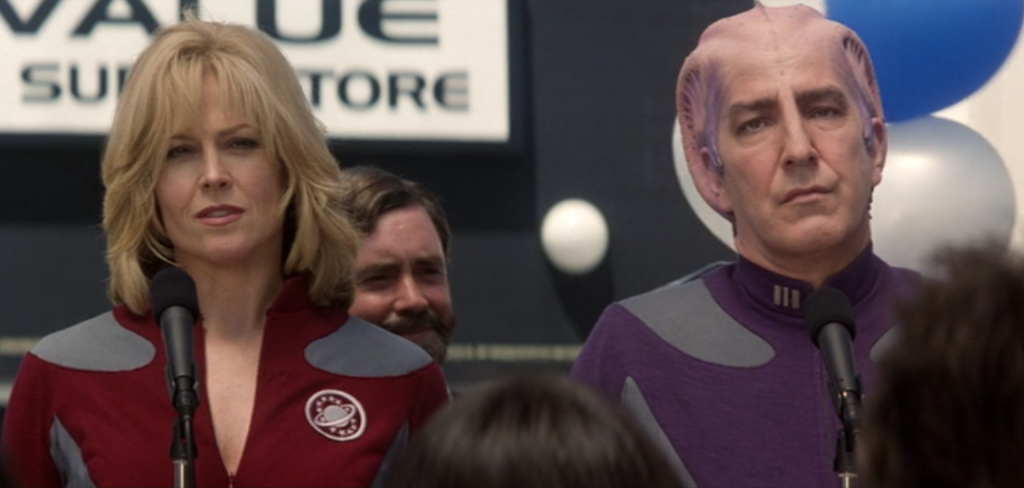
The movie is a nostalgic parody of Star Trek in many ways, poking fun at the illogical plot holes, episode tropes and character stereotypes. Guy Fleegman (Sam Rockwell) plays Crewman #6, who dies on episode 82 of the show and is a nod to Guy Vardaman – an actor who played several no-name characters on TNG. Guy continues to host conventions even though the cast never remembers him and tags along with them at every opportunity. He’s also the character who most recurrently points out the tropes in the movie as events unfurl, becoming increasingly convinced that he is going to die as a glorified extra like he did in the show. One of Gordon’s favorite lines he wrote for the film is when Gwen DeMarco (Sigourney Weaver) says, “We gotta get out of here before one of those things kills Guy!” At some point, the cast begins to accept the fandom of the show as the basis of their reality and embrace the characters they had grown to resent. Even Dane is able to find the meaning in his role as Dr. Lazarus, reciting the line he once reviled with such passion as the dying Quellek lay in his arms. Even though the film is a parody, it was punctured by very moving scenes and the chemistry between the characters is by far its greatest strength.

At the heart of that lies the story of Jason Nesmith, the egotiscal star who revels in reliving his glory days as Cmdr. Peter Quincy Taggart. Early in the film, he becomes depressed after overhearing attendees at a convention mocking him and the crew and lashes out at an avid fan, Brandon (Justin Long). He echoes a line from Shatner’s 1986 skit when he yells “It’s just a TV show!”, leaving his fans shaken and upset at his rejection of the series. By the end of the film, Nesmith has grown into his role leading his crew and understands the impact they’ve had on the lives of others through the friendship he develops with the Thermian leader, Mathesar (Enrico Colantoni). The most emotional and moving scene in the film is arguably when Nesmith is forced to explain to Mathesar that everything they’ve based their society on is a lie, that Galaxy Quest really is just a TV show. Mathesar is shaken by the betrayal, as Nesmith struggles to explain a concept he so easily used as a heated rebuke to Brandon and other fans earlier in the movie. It’s the moment where he realizes how important the show really was to him. Evidently Nesmith’s character is meant to represent Shatner in the film and his amazing arc in the movie mirrors the same revelations about embracing fandom that Shatner extols in his book.
“Though Star Trek’s fandom may be rooted in science-fiction, it revolves, and thrives, around friendship, belonging, love, hope, and understanding.” – William Shatner
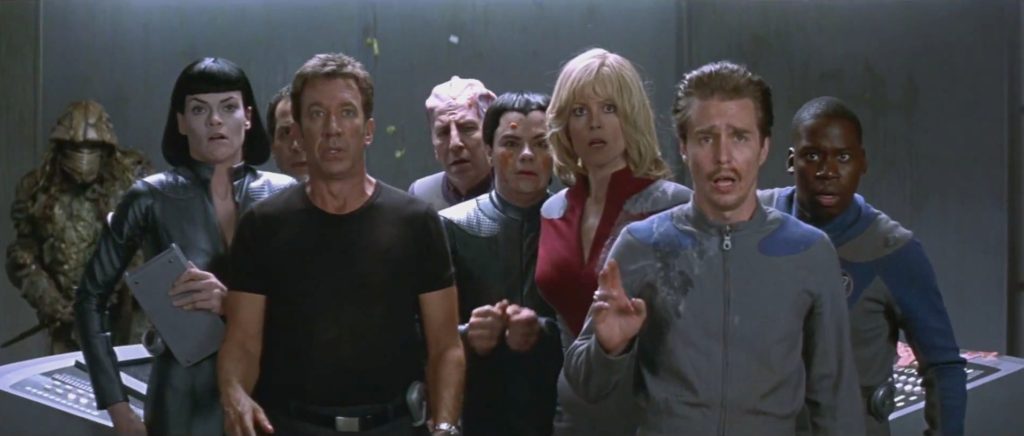
The reason Galaxy Quest was so successful as a parody of a sci-fi franchise is because the comedy is played straight. Even though it makes light of fandom, it doesn’t reject it or mock it, and the characters eventually come to depend on it. It provides the necessary catharsis both fans and cast members sorely needed, easing the tension in a fractured fandom that was able to finally laugh at itself without derision. The definitive message of the film is that Galaxy Quest (and by proxy Star Trek) is nothing without its fans. Not only do they play a critical role in aiding the crew to save the lives of an alien race with their in-depth knowledge of the show, but they also help mend the friendships between the cast members, worn away by years of friction and bitterness that arose after they were cancelled. Not unlike how Trekkers were at the heart of the resurgence that brought TOS to the silver screen and cemented the franchise for years to come, at the end of Galaxy Quest the fans and cast have successfully re-energized the show, leading to its renewal.
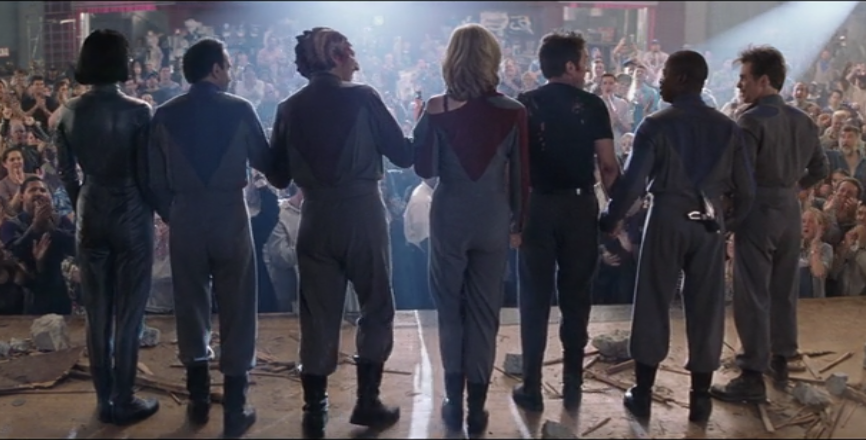
Galaxy Quest is so beloved by Trekkers that at the 2013 Convention in Las Vagas it was voted the 7th best Star Trek film of all time, surpassing nearly half of the canon movies. But the beauty of it all is that you don’t need to be a Star Trek fan to enjoy the film. It recasts the dated image of the Star Trek franchise, insulated by a zealous and entrenched fandom, and made it accessible to new audiences and demographics. Galaxy Quest did more than just spoof Star Trek, it successfully tapped into what makes it such a revered series — reconnecting fans, creators, and cast through a clever satire reminiscent of an episode of TOS.


![[LIST] SUMMERTIME DREAD: DAYLIGHT HORROR MOVIES PERFECT FOR SUMMER](https://geekd-out.com/wp-content/uploads/2021/06/daytimehorrorheader-150x150.jpg)
